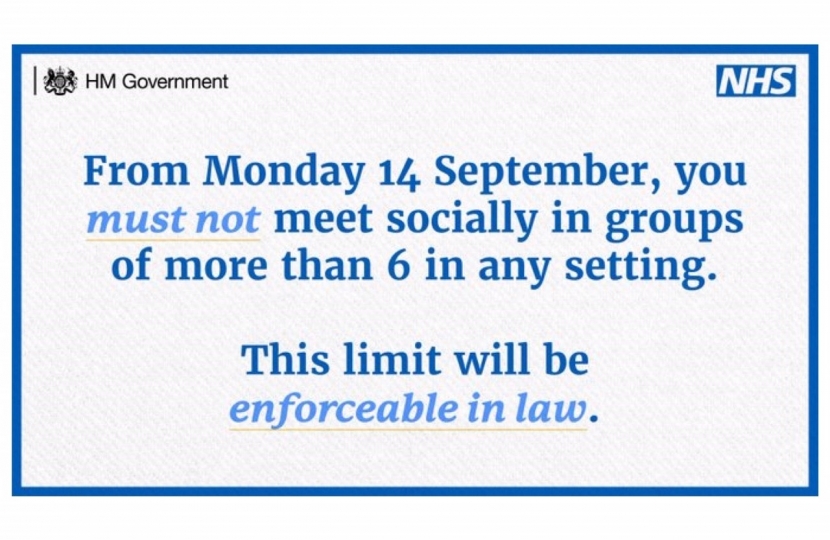
Despite the enormous sacrifices of the British people over the last few months, the latest figures have shown an increase in the number of coronavirus cases. We need to act now to stop the virus from spreading. At today’s press conference, the Prime Minister has announced that, with reasonable exemptions, the number of people legally allowed to meet socially will be reduced from thirty to six.
This new lower limit will make it easier for everyone to understand what is expected and for the police to identify and disperse illegal gatherings. It is absolutely critical that people abide by these rules and remember the basics – washing your hands, covering your face, keeping space from others, and getting a test if you have symptoms.
We are simplifying and strengthening the rules – making them easier for people to understand and for the police to enforce:
- From Monday 14 September, in England, it will be illegal to meet in groups of more than six people. This will apply in any setting – indoors or outdoors, at home or in the pub. The ban will be set out in law and enforced by the police – anyone breaking the rules risks being dispersed, fined and possibly arrested. This single measure replaces both the existing ban on gatherings of more than 30 and the current guidance on allowing 2 households to meet indoors. Now people only need to remember the rule of six.
- Introducing only limited exemptions to the rule of six. If a single household or support bubble is larger than six, they can still gather. Likewise, Covid Secure venues like places of worship, gyms, restaurants and hospitality venues can still hold more than six people in total – however, within the venues there must not be individual groups larger than six. Education and workplaces are unaffected.
- Enforcing the rules more strongly. Premises where people meet socially will be legally required to request the contact details of a member of every party for NHS Test and Trace, and retain them for 21 days. Fines will be levied against hospitality venues failing to ensure their premises are Covid-secure. And Border Force will step up enforcement efforts at the border to ensure people are complying with the quarantine rules.
- Introducing Covid-secure Marshalls. The Marshalls will help ensure social distancing in towns and cities centres, and we will support local authorities to make further and faster use of their powers to close venues that are breaking the rules and pose a risk to public health.
- Revising existing plans to reopen some activities. We must now revise plans to pilot larger audiences in venues later this month and review our intention to return audiences to stadiums and conference centres from 1 October.
- Ensuring schools and colleges are the very last places to shut in the event of a local lockdown. As the Chief Medical Officer and Chief Scientific Adviser have said, the long term risks to children’s life chances of not going to school are significant and far greater than the health risks of going back to school. We have today also published new guidance for universities on how they can operate in a Covid Secure way.
While a vaccine is developed, we are working on an alternative plan which could allow life to return closer to normality – based on mass testing:
- Increasing testing capacity to 500,000 tests a day by the end of October. We have already increased capacity from 2,000 tests a day in March to around 300,000 test a day currently.
- Planning to use testing to identify people who are negative. In the near future, mass testing will allow us to identify people who do not have coronavirus, allowing them to lead more normal lives in the knowledge they cannot infect anyone else.
- Introducing faster coronavirus tests. We believe new types of tests, which are capable of giving results in as little as 20 minutes, will become available. We hope to deploy these on a far bigger scale than any country has yet achieved – literally millions of tests processed every day.
- Providing £500 million to speed up coronavirus testing and assess the benefits of repeat population testing, helping to get us back to a more normal way of life. We will fund a new, community-wide trial in Salford, launching immediately, to assess the benefits of repeat population testing.
All this progress is contingent on continued scientific advances and though we’re hopeful, we cannot 100 per cent guarantee that those advances will be made. That is why it is so important that we take these tough measures now.
So let’s work together and follow the rules: meet in groups of no more than six. Wash your hands, cover your face, and make space.
